BLOGS BY:
Defrazzle Me
Exhausted and then some...

Navigating Burnout During Menopause or is it… Menopause During Burnout?
Introduction:
For many women aged 40–55, life feels like a relentless juggling act. Caught between the demands of a career, raising children, and caring for aging parents, they embody the "sandwich generation". Add menopause to the mix, with its hormonal upheavals and physical challenges, and it's no wonder burnout is fast becoming a common experience.
Burnout, characterized by emotional exhaustion, detachment, and reduced productivity, is particularly prevalent among women in this life stage.
Studies show that 1 in 4 Australian women in midlife report feeling overwhelmed by caregiving responsibilities, a major contributor to burnout. The hormonal changes of menopause—declining estrogen and progesterone—further exacerbate stress, fatigue, and mood swings. These changes can disrupt sleep, leading to chronic exhaustion, reduced resilience and the adoption of maladaptive coping mechanisms such as booze, sugar, Netflix binging, smoking and many more.
The workplace adds another layer of complexity. Women in midlife often face ageism and a lack of understanding about menopause. Research indicates that 81% of Australian workers report experiencing stress and burnout, with women in the sandwich generation disproportionately affected. This dual burden of professional and personal responsibilities can lead to feelings of inadequacy and isolation. A viscous cycle.

So, how can women effectively navigate this challenging phase?
Prioritise Self-Care - Regular exercise, a balanced diet, and mindfulness practices can help regulate mood and energy levels. Studies show that physical activity reduces fatigue and improves mental health. Moving your body at this stage of life should not even be a negotiable. You have to help yourself to help others.
Seek Support - Whether it's joining a caregiver support group, assistance from a naturopath, GP or professional counselling, sharing the load will, without a single doubt, alleviate feelings of isolation. Positive social connections are proven to buffer against stress and make you feel less like you are going crazy. Trust me.
Set Boundaries - Learn to say no to additional responsibilities that stretch you too thin. Protecting your time and energy is essential for long-term well-being. Haha easy to say – but it is paramount to protect your energy resources. Draining energy reserves with bullsh%& tasks and commitments, is like pouring water into sieve.
Advocate for Workplace Support - Flexible work arrangements and open conversations about menopause should be a non-negotiable now. It’s the 21st century. This is a paramount intergenerational workforce challenge. I personally believe that it would be discriminatory not to take it into consideration for policy, however more than that it can work out to be a considerable cost saving for corporations, if addressed professionally.
Consider Supplements - Nutrients like magnesium, B vitamins, and omega-3s can help combat fatigue and support overall health. Whether you wish to undertake it with a mainstream medical approach or a natural approach – just do it. It will be life changing.
You are not alone. Burnout is a signal, not a failure. It is your body whispering to you…or perhaps yelling, depending at which point you accept it. By acknowledging your limits and seeking support, you can navigate this phase (perhaps with not as much grace as you had first envisioned).
As they say, you can’t pour from an empty cup.
Keep shining queens.

Marianne Edmonds
Licensed Clinical Mental Health Counsellor Specializing In Cognitive Behavioural Therapy & Behaviour Change | Burnout | Resilience | Maladaptive Behaviour | Alcohol - Recovery | Breathwork Coach | Orange Sky Volunteer
Take the first step towards recovery
and book a free consultation with
Defrazzle Me today.
Let's Connect
NAVIGATE
CONTACT US
+61 412 348 141



